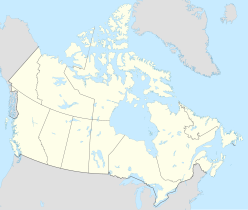Saint Martin impact structure: Difference between revisions
No edit summary Tags: Mobile edit Mobile app edit Android app edit |
→External links: rm'd stub tag |
||
| Line 51: | Line 51: | ||
* [http://craterexplorer.ca/st-martin-impact-structure/ Aerial exploration of the St. Martin structure] |
* [http://craterexplorer.ca/st-martin-impact-structure/ Aerial exploration of the St. Martin structure] |
||
{{Portal|Geology|Canada |
{{Portal|Geology|Canada |
||
}} |
|||
{{Impact cratering on Earth}} |
|||
[[Category:Impact craters of Manitoba]] |
[[Category:Impact craters of Manitoba]] |
||
[[Category:Triassic impact craters]] |
[[Category:Triassic impact craters]] |
||
[[Category:Triassic Canada]] |
[[Category:Triassic Canada]] |
||
{{Manitoba-geo-stub}} |
|||
{{Canada-geology-stub}} |
|||
Revision as of 18:31, 22 November 2021
| Saint Martin crater | |
|---|---|
| Impact crater/structure | |
| Confidence | Confirmed |
| Diameter | 40 km (25 mi) |
| Age | 227.8 ± 1.1 Ma Carnian |
| Exposed | No |
| Drilled | Yes |
| Location | |
| Coordinates | 51°47′N 98°32′W / 51.783°N 98.533°W |
| Country | Canada |
| Province | Manitoba |
| Municipality | Grahamdale |
Saint Martin is an impact crater in Manitoba, Canada.[1] It is located in the northern part of the Rural Municipality of Grahamdale, northwest of Lake St. Martin.
The crater is 40 km (25 mi) in diameter and its age was determined to be 227.8 ± 1.1 million years[2] (Carnian stage of the Triassic) using the argon-argon dating technique. The crater is well preserved but poorly exposed at the surface as the whole region is covered by glacial drift.
Hypothetical multiple impact event
It had previously been suggested by Geophysicist David Rowley of the University of Chicago, working with John Spray of the University of New Brunswick and Simon Kelley of the Open University, that the Saint Martin crater may have been part of a hypothetical multiple impact event which also formed the Manicouagan crater in northern Quebec, Rochechouart crater in France, Obolon' crater in Ukraine, and Red Wing crater in North Dakota.[3] All of the craters had previously been known and studied, but their paleoalignment had never before been demonstrated. Rowley has said that the chance that these craters could be aligned like this due to chance are nearly zero.[4]
References
- ^ "Saint Martin". Earth Impact Database. Planetary and Space Science Centre University of New Brunswick Fredericton. Retrieved 15 September 2019.
- ^ Schmieder M., Jourdan F., Tohver, E. and Cloutis, E. A. 2014. 40Ar/39Ar age of the Lake Saint Martin impact structure (Canada) - Unchaining the Late Triassic terrestrial impact craters. Earth Planet. Sci. Lett. (in press)
- ^ Spray, J.G., Kelley, S.P. and Rowley, D.B. (1998). "Evidence for a late Triassic multiple impact event on Earth". Nature, v. 392, pp. 171-173. Abstract
- ^ Steele, Diana (19 March 1998). "Crater chain points to impact of fragmented comet". University of Chicago Chronicle.



